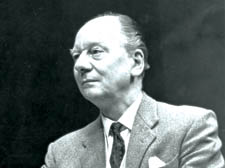|
|
 |
| |

Sir John Gielgud |
How gay hate almost finished Gielgud
ON the charge sheet his name was John Smith. But when he stepped into the dock at Bow Street just one person, a woman reporter, recognised him as John Gielgud, then at the height of his fame as an actor.
And he was there because he had been arrested in a public lavatory in Chelsea and charged with “persistently importuning men for immoral purposes”, a crime he feared would ruin his career as the headlines splashed around him.
But newly knighted Gielgud survived, despite the witch-hunt then against gays. He was actually applauded when he next appeared on stage, although he later admitted he had contemplated suicide such was the disgrace, in 1953, when he was apprehended.
Now, more than half a century on, theatre critic and author Nicholas de Jongh has written a play, Plague Over England, about the scandal.
And, in many ways, the play, which opens at the Finborough Theatre, west London, tomorrow (Friday) is an angry outburst at the hypocrisy of our age and the fact that homophobia is still rife today.
De Jongh dismisses as “drivel” claims by historians that there was no witch-hunt against homosexuals in the 1950s and that there wasn’t a rapid rise in the number of prosecutions against them.
“There was an inexorable rise accompanied by continual expressions of anxiety about what they described as an epidemic or a cancer,” he told me at his home in Islington.
“Nowadays, Stonewall, the gay charity, have suggested that there is an epidemic of gay bullying in schools. It is still extremely difficult for large numbers of gay people in adolescence to feel OK about themselves.
“My play is written for 25 to 30-year-olds of all sexual persuasions who are interested in the state of England, not just now but in the past too. And I believe in the theatre being used as a forum for historical investigation. I see the Gielgud case as a microcosm of the vicious intolerance.”
De Jongh knew Gielgud, who died in 2000, aged 96, during his early days as a journalist on the Guardian.
“He was a wonderfully compassionate, generous man despite his image of aloofness,” he recalls. “He said to me once, ‘I thought of killing myself’, but he never talked about the court case beyond that one sad reference.”
GERALD ISAAMAN
|

|
 |
|
 |
|

